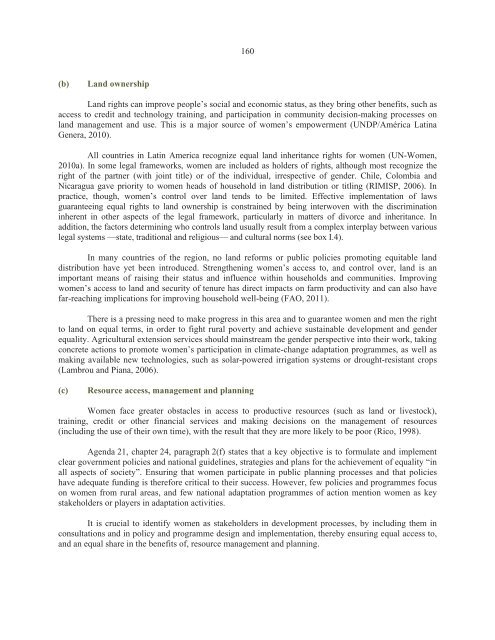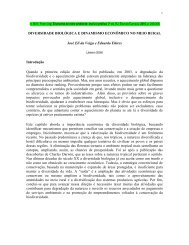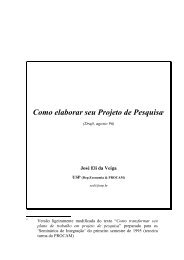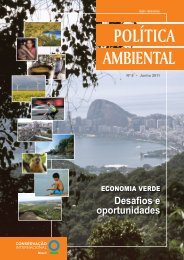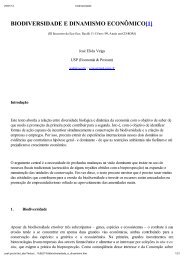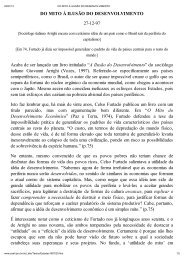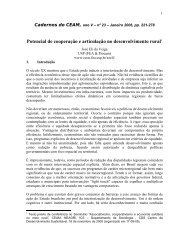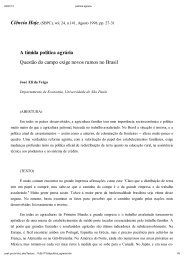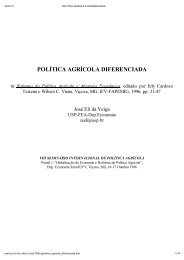sustainable development 20 years on from the ... - José Eli da Veiga
sustainable development 20 years on from the ... - José Eli da Veiga
sustainable development 20 years on from the ... - José Eli da Veiga
You also want an ePaper? Increase the reach of your titles
YUMPU automatically turns print PDFs into web optimized ePapers that Google loves.
160<br />
(b)<br />
Land ownership<br />
Land rights can improve people’s social and ec<strong>on</strong>omic status, as <strong>the</strong>y bring o<strong>the</strong>r benefits, such as<br />
access to credit and technology training, and participati<strong>on</strong> in community decisi<strong>on</strong>-making processes <strong>on</strong><br />
land management and use. This is a major source of women’s empowerment (UNDP/América Latina<br />
Genera, <str<strong>on</strong>g>20</str<strong>on</strong>g>10).<br />
All countries in Latin America recognize equal land inheritance rights for women (UN-Women,<br />
<str<strong>on</strong>g>20</str<strong>on</strong>g>10a). In some legal frameworks, women are included as holders of rights, although most recognize <strong>the</strong><br />
right of <strong>the</strong> partner (with joint title) or of <strong>the</strong> individual, irrespective of gender. Chile, Colombia and<br />
Nicaragua gave priority to women heads of household in land distributi<strong>on</strong> or titling (RIMISP, <str<strong>on</strong>g>20</str<strong>on</strong>g>06). In<br />
practice, though, women’s c<strong>on</strong>trol over land tends to be limited. Effective implementati<strong>on</strong> of laws<br />
guaranteeing equal rights to land ownership is c<strong>on</strong>strained by being interwoven with <strong>the</strong> discriminati<strong>on</strong><br />
inherent in o<strong>the</strong>r aspects of <strong>the</strong> legal framework, particularly in matters of divorce and inheritance. In<br />
additi<strong>on</strong>, <strong>the</strong> factors determining who c<strong>on</strong>trols land usually result <strong>from</strong> a complex interplay between various<br />
legal systems —state, traditi<strong>on</strong>al and religious— and cultural norms (see box I.4).<br />
In many countries of <strong>the</strong> regi<strong>on</strong>, no land reforms or public policies promoting equitable land<br />
distributi<strong>on</strong> have yet been introduced. Streng<strong>the</strong>ning women’s access to, and c<strong>on</strong>trol over, land is an<br />
important means of raising <strong>the</strong>ir status and influence within households and communities. Improving<br />
women’s access to land and security of tenure has direct impacts <strong>on</strong> farm productivity and can also have<br />
far-reaching implicati<strong>on</strong>s for improving household well-being (FAO, <str<strong>on</strong>g>20</str<strong>on</strong>g>11).<br />
There is a pressing need to make progress in this area and to guarantee women and men <strong>the</strong> right<br />
to land <strong>on</strong> equal terms, in order to fight rural poverty and achieve <str<strong>on</strong>g>sustainable</str<strong>on</strong>g> <str<strong>on</strong>g>development</str<strong>on</strong>g> and gender<br />
equality. Agricultural extensi<strong>on</strong> services should mainstream <strong>the</strong> gender perspective into <strong>the</strong>ir work, taking<br />
c<strong>on</strong>crete acti<strong>on</strong>s to promote women’s participati<strong>on</strong> in climate-change a<strong>da</strong>ptati<strong>on</strong> programmes, as well as<br />
making available new technologies, such as solar-powered irrigati<strong>on</strong> systems or drought-resistant crops<br />
(Lambrou and Piana, <str<strong>on</strong>g>20</str<strong>on</strong>g>06).<br />
(c)<br />
Resource access, management and planning<br />
Women face greater obstacles in access to productive resources (such as land or livestock),<br />
training, credit or o<strong>the</strong>r financial services and making decisi<strong>on</strong>s <strong>on</strong> <strong>the</strong> management of resources<br />
(including <strong>the</strong> use of <strong>the</strong>ir own time), with <strong>the</strong> result that <strong>the</strong>y are more likely to be poor (Rico, 1998).<br />
Agen<strong>da</strong> 21, chapter 24, paragraph 2(f) states that a key objective is to formulate and implement<br />
clear government policies and nati<strong>on</strong>al guidelines, strategies and plans for <strong>the</strong> achievement of equality “in<br />
all aspects of society”. Ensuring that women participate in public planning processes and that policies<br />
have adequate funding is <strong>the</strong>refore critical to <strong>the</strong>ir success. However, few policies and programmes focus<br />
<strong>on</strong> women <strong>from</strong> rural areas, and few nati<strong>on</strong>al a<strong>da</strong>ptati<strong>on</strong> programmes of acti<strong>on</strong> menti<strong>on</strong> women as key<br />
stakeholders or players in a<strong>da</strong>ptati<strong>on</strong> activities.<br />
It is crucial to identify women as stakeholders in <str<strong>on</strong>g>development</str<strong>on</strong>g> processes, by including <strong>the</strong>m in<br />
c<strong>on</strong>sultati<strong>on</strong>s and in policy and programme design and implementati<strong>on</strong>, <strong>the</strong>reby ensuring equal access to,<br />
and an equal share in <strong>the</strong> benefits of, resource management and planning.


